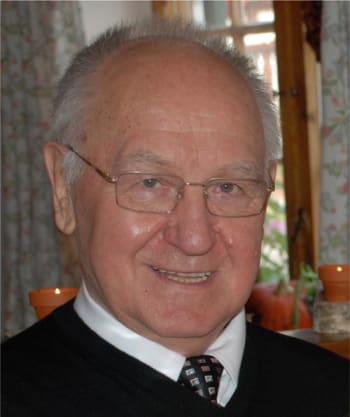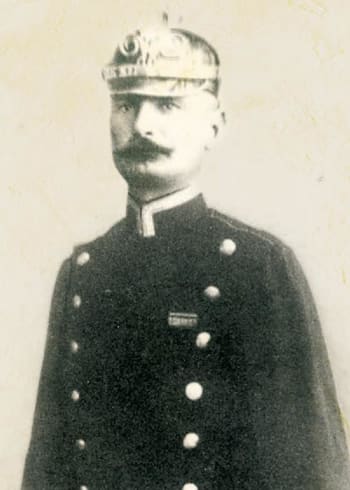Rundel Video: Alte Kameraden - Old Comrades | Media center
HomepageMedia centerRundel Video: Alte Kameraden - Old Comrades
This Media Center item can only be displayed if you agree to the use of marketing cookies. With one click you can accept it.
Alte Kameraden - Old Comrades
Info
Notes available at:
https://www.rundel.de/en/
Konzertformat / Concert Size
It is the greatest tragedy in the life of a young composer if he happens to write his most successful piece at the beginning of his musical career. This holds true for Carl Teike, as the unsurpassed success at the beginning of his musical life was his march “Old Comrades”. It is a sparkling piece that may well be labeled to be the German “march of marches”. Carl Teike was born on Feb. 05, 1864 in Altdamm. After his parents had moved to Stettin, he had early contacts with military music as a youngster. The enthusiasm for this kind of music never left him throughout his life. He began a musical apprenticeship with City Music Director Böttcher in Wollin and already played in the spa orchestra of Bad Misdroy, which Böttcher conducted. Upon completing his apprenticeship, he enlisted as a volunteer in the band of the (5th Württemberg) King Karl Grenadiers No. 123 in Ulm. The musical and military environment there proved to be ideal for the ambitious young musician, who hoped to eventually study band music at the University of Music in Berlin. Above all, his military superior, bandmaster Julius Schreck supported young Teike wherever he could. Unfortunately the time in Ulm took a very unhappy turn, as Schreck’s successor was extremely resentful towards Teike, and musical support was replaced by sheer harassment. On account of this, Teike retired from the military towards the end of 1889. Short employments in Ravensburg and Ulm evidently did not suit Teike, who was of northern German descent. This is why he applied for the Royal Police Force in Potsdam. Teike was accepted and entered service in 1895. The royal capital of the Hohenzollerns obviously stirred Teike to write a number of brilliant marches. He even became known abroad as the “musical policeman”. Unfortunately he contracted a severe pneumonia while on duty, which eventually forced him to retire from the Royal Police Force in Potsdam. On February 01, 1909 he and his family moved to the prosperous provincial city of Landsberg on the Warthe (which is located east of Berlin in present-day Poland). There, Count Clairon d’Haussonville proved to be an understanding superior who paved the way for modest Carl Teike to continue composing, as his creativity had not suffered from this move. The disease which he had caught in Potsdam evidently was more severe than he was inclined to accept. In spring 1922, his state of health became worse, and in May of that year he passed away. Much too early - as many people felt. Teike’s marches constitute an enrichment of the German concert march, as he never composed any street marches. Clear structures, musical ingenuity and a multitude of tone colors distinguish his works and shape them into something really new. It is this type of the march in particular that became the bedrock of the universal appeal of the German march. Even today Teike’s marches stand unrivaled for musical quality and content – and they never are aggressive. Toward the end of his tour of duty in Ulm, Teike handed a new march to his superior, which, at the time, did not have a title yet. He in turn told Teike to “put it in a stove and burn it”. As we know today, this was a classic misappraisal, as Teike subsequently named his march “Old Comrades” in view of his impending retirement. We do not even need to discuss the acceptance the march has met and still meets all over the world, as “Old Comrades” simply always has been a march of universal appeal. In his new arrangement, Siegfried Rundel did not change the essence of Teike’s music, he rather sensitively adapted it to modern musical practice and to the instrumentation of the symphonic band on the basis of his deep respect for the works of Carl Teike.
Also available in March Size (see number MVSR 2390M)
Grade Level GB: 4-5
Grade Level USA: 3 (Intermediate)
Composer: Teike, Carl
Arranger: Rundel, Siegfried
Genre: Concert March, March, Traditional March
Performance time: 00:03:00
Publisher: Rundel
Size: A4
Info: Full Score + Condensed Score + Parts
Rundel Order Number: MVSR2390
Release Date: 2001
https://www.rundel.de/en/
Konzertformat / Concert Size
It is the greatest tragedy in the life of a young composer if he happens to write his most successful piece at the beginning of his musical career. This holds true for Carl Teike, as the unsurpassed success at the beginning of his musical life was his march “Old Comrades”. It is a sparkling piece that may well be labeled to be the German “march of marches”. Carl Teike was born on Feb. 05, 1864 in Altdamm. After his parents had moved to Stettin, he had early contacts with military music as a youngster. The enthusiasm for this kind of music never left him throughout his life. He began a musical apprenticeship with City Music Director Böttcher in Wollin and already played in the spa orchestra of Bad Misdroy, which Böttcher conducted. Upon completing his apprenticeship, he enlisted as a volunteer in the band of the (5th Württemberg) King Karl Grenadiers No. 123 in Ulm. The musical and military environment there proved to be ideal for the ambitious young musician, who hoped to eventually study band music at the University of Music in Berlin. Above all, his military superior, bandmaster Julius Schreck supported young Teike wherever he could. Unfortunately the time in Ulm took a very unhappy turn, as Schreck’s successor was extremely resentful towards Teike, and musical support was replaced by sheer harassment. On account of this, Teike retired from the military towards the end of 1889. Short employments in Ravensburg and Ulm evidently did not suit Teike, who was of northern German descent. This is why he applied for the Royal Police Force in Potsdam. Teike was accepted and entered service in 1895. The royal capital of the Hohenzollerns obviously stirred Teike to write a number of brilliant marches. He even became known abroad as the “musical policeman”. Unfortunately he contracted a severe pneumonia while on duty, which eventually forced him to retire from the Royal Police Force in Potsdam. On February 01, 1909 he and his family moved to the prosperous provincial city of Landsberg on the Warthe (which is located east of Berlin in present-day Poland). There, Count Clairon d’Haussonville proved to be an understanding superior who paved the way for modest Carl Teike to continue composing, as his creativity had not suffered from this move. The disease which he had caught in Potsdam evidently was more severe than he was inclined to accept. In spring 1922, his state of health became worse, and in May of that year he passed away. Much too early - as many people felt. Teike’s marches constitute an enrichment of the German concert march, as he never composed any street marches. Clear structures, musical ingenuity and a multitude of tone colors distinguish his works and shape them into something really new. It is this type of the march in particular that became the bedrock of the universal appeal of the German march. Even today Teike’s marches stand unrivaled for musical quality and content – and they never are aggressive. Toward the end of his tour of duty in Ulm, Teike handed a new march to his superior, which, at the time, did not have a title yet. He in turn told Teike to “put it in a stove and burn it”. As we know today, this was a classic misappraisal, as Teike subsequently named his march “Old Comrades” in view of his impending retirement. We do not even need to discuss the acceptance the march has met and still meets all over the world, as “Old Comrades” simply always has been a march of universal appeal. In his new arrangement, Siegfried Rundel did not change the essence of Teike’s music, he rather sensitively adapted it to modern musical practice and to the instrumentation of the symphonic band on the basis of his deep respect for the works of Carl Teike.
Also available in March Size (see number MVSR 2390M)
Grade Level GB: 4-5
Grade Level USA: 3 (Intermediate)
Composer: Teike, Carl
Arranger: Rundel, Siegfried
Genre: Concert March, March, Traditional March
Performance time: 00:03:00
Publisher: Rundel
Size: A4
Info: Full Score + Condensed Score + Parts
Rundel Order Number: MVSR2390
Release Date: 2001
Recommended Articles
Alte Kameraden
Old Comrades
It is the greatest tragedy in the life of a young composer if he happens to write his most successful piece at the beginning of his musical career. This holds true for Carl Teike, as the unsurpassed...Concert Band
MVSR2390
Alte Kameraden
Old Comrades
It is the greatest tragedy in the life of a young composer if he happens to write his most successful piece at the beginning of his musical career. This holds true for Carl Teike, as the unsurpassed...Concert Band
MVSR2390M
Recommended Persons
Siegfried Rundel
* 27.04.1940† 09.04.2009
Siegfried Rundel was born in Bußmannshausen on April 27, 1940. His fascination and natural talent for music showed from an early age. He played the trombone in the community band and tried first compositions and arrangements as a teenager. His teachers were pioneers of the German wind band development, such as Hans Feliy Husadel, Gustav Lotterer und Hellmut Haase-Altendorf. Siegfried Rundel...Info
Carl Teike
* 05.02.1864† 28.05.1922
Carl Teike wurde am 05.02.1864 in Altdamm geboren. Nachdem die Eltern in die Nähe von Stettin gezogen waren, kam der Junge früh mit der Militärmusik in Berührung, die eine Begeisterung in ihm entfachte, welche ihn nicht mehr los lies. Er trat eine Musikausbildung bei Stadtmusikdirektor Böttcher in Wollin an und spielte bereits während dieser Zeit in der von Böttcher geleiteten Kurkapelle in Bad...Info
Media center
RUNDEL VIDEO
Hoch Heidecksburg
Notes available at:
https://www.rundel.de/en/
Hail Heidecksburg / The Watch Tower
It appears to be the fate of many a great, and even...
https://www.rundel.de/en/
Hail Heidecksburg / The Watch Tower
It appears to be the fate of many a great, and even...
RUNDEL VIDEO
Venezia
Notes available at:
https://www.rundel.de/en/
Marcia Militare Italiana
The march „Venezia” by Gaetano Fabiani (1841-1904) is...
https://www.rundel.de/en/
Marcia Militare Italiana
The march „Venezia” by Gaetano Fabiani (1841-1904) is...
RUNDEL VIDEO
Graf Zeppelin
Notes available at:
https://www.rundel.de/en/
Marsch / March / Marche
When one considers the lasting success of several sparkling marches by...
RUNDEL VIDEO
Jubelklänge
Notes available at:
https://www.rundel.de/en/
Sounds of Elation
The composer and music director Ernst Uebel (1882-1959) spent most of...
https://www.rundel.de/en/
Sounds of Elation
The composer and music director Ernst Uebel (1882-1959) spent most of...
RUNDEL VIDEO
In Treue fest
Notes available at:
https://www.rundel.de/en/
Marsch
When Carl Teike enlisted in 1883 in the Grenadiers Regiment King Karl (5th...
https://www.rundel.de/en/
Marsch
When Carl Teike enlisted in 1883 in the Grenadiers Regiment King Karl (5th...
RUNDEL VIDEO
Jetzt geht's los
Notes available at:
https://www.rundel.de/en/
Marsch
Jetzt gehts los, op.17
It is probably not generally known that Franz Lehár,...
https://www.rundel.de/en/
Marsch
Jetzt gehts los, op.17
It is probably not generally known that Franz Lehár,...



